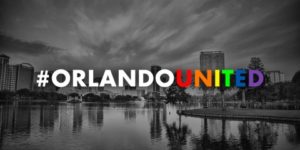
It is understandable why most early news coverage of the massacre at the Pulse nightclub in Orlando characterized it a massive anti-LGBT hate crime. Reports were that a popular gay nightclub was the site of the deadliest mass shooting in United States history. Later, some politicians failed to acknowledge the LGBT connection to the massacre, opting instead to generalize the event as an apparent incident of domestic terrorism. Nevertheless, the antigay character of the story was clear from the start.
Yesterday evening, though, a full list of those who lost their lives was released. Some newscasters and reporters chose to read their names on the air. Sotomayor, Martinez, Velasquez, Rios… Most of the last names had something unmistakable in common. Guerrero, Torres, Rosado, Perez…this was not only a mass shooting that slaughtered 49 young LGBT people. Fernandez, Flores, Barrios, Ayala…this was a massacre of mostly Latino/a LGBT people, at what the Pulse nightclub called its regular “Latin Night.”
For LGBT people of color, and Latinos/as especially, gay bars and nightclubs — and particularly Latin nights in these spaces — have been as safe havens, as spaces for creative expression, and as refuges from a hostile world. Latino/a LGBTs are a minority within a minority, doubly disadvantaged and especially vulnerable. Along with that, higher rates of religiosity among Latinos, and especially the devotion to faith traditions that are particularly intolerant of homosexuality and gender non-conformity, have caused heavy friction between Latino LGBT youth and their birth families.
Nightclubs and bars have long figured prominently in the lives of LGBT people of all racial and ethnic backgrounds. The Stonewall Rebellion of 1969, what many call the start of the modern LGBT rights movement, took place at New York City’s Stonewall Inn – a gay bar. As Richard Kim eloquently observed, “Gay bars are therapy for people who can’t afford therapy; temples for people who lost their religion, or whose religion lost them; […and] homes for folk without families.”
These spaces provide a very special kind of safety, and a very precious and rare kind of comfort, of community. For many of people, these spaces are home. This is why the removal of the Latino/a angle to this story misses much of it. It completely underestimates the destruction, and understates the harm caused by the murderer— both to the scores of victims he tortured, killed or injured, and to the countless people he traumatized and terrorized. It should encourage us to recognize the special burdens endured by Latino/a LGBT youth, and to do what we can to lessen the trauma that this horrific act has caused.

Recent Comments